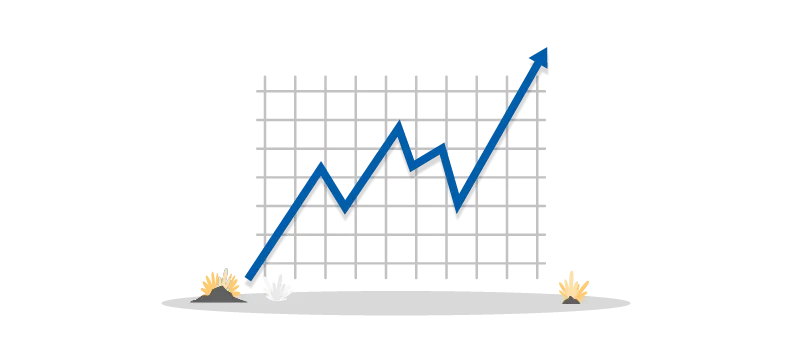Impact of economic trends on long-term capital gains


Long-term capital gains (LTCG) are derived from the appreciation of assets held for a specified period, usually more than a year. They play an important role in shaping investment decisions and wealth accumulation strategies. This is because capital gains from assets held for a shorter duration are taxed at a higher rate than capital gains from assets held for a longer duration. Currently, capital gains made from holding equity and equity-oriented funds for more than one year are considered long-term capital gains on mutual funds in India.
Economic trends also affect capital gains in India. Let’s understand what they are and the impact of economic trends on long-term capital gains.
- Table of contents
- Understanding economic trends
- What is the impact of economic trends on long-term capital gains?
- Navigating the mutual fund landscape
- FAQ
Understanding economic trends
Economic trends encompass many factors, including GDP growth, inflation rates, fiscal policies, and global market dynamics, among others. These trends influence asset prices, investor sentiment, and the overall investment climate, thereby shaping the trajectory of long-term capital gains on mutual funds in India. However, some factors affect the returns on investment more than others. In an increasingly interconnected global economy, Indian financial markets are susceptible to the influence of international economic trends and geopolitical developments as well.
What is the impact of economic trends on long-term capital gains?
- Rate of inflation: Inflation can silently erode wealth as it can diminish the purchasing power of capital over time, thereby reducing the actual value of gains realised by investors. To mitigate this adverse effect, investors can seek avenues offering returns that have the potential to beat the inflation rate.
- Economic growth: It is easy to see how the economy impacts long-term capital gains. Robust economic growth typically correlates with favourable conditions for long-term capital appreciation because businesses thrive, consumer spending increases and investor confidence soars. This increases asset prices and boosts long-term capital gains on mutual funds. On the other hand, economic slowdowns may trigger market volatility that may pose challenges for long-term wealth creation.
- Government policies: The introduction of new government policies or modification of old ones can have considerable influence over the taxation framework governing long-term capital gains. For instance, the scrapping of favourable taxation on long-term capital gains from debt funds in 2023 affected the real returns and investment strategies of many investors in India.
Navigating the mutual fund landscape
The impact of economic trends on long-term capital gains can be considerable. Investors must also keep an eye on the macroeconomic forces, market dynamics, and investor behaviour in the local and global markets. Doing this can allow them to find investment strategies conducive to long-term wealth creation through mutual funds and other investment instruments.
There are different types of mutual funds to cater to different types of investors. Since equity and equity-related instruments have historically demonstrated the ability to deliver potentially inflation-beating returns over the long term, investors must add them to their portfolios based on their risk appetite. This will enhance the potential for meaningful long-term capital gains. Diversification across asset classes can also help create a balanced portfolio.
- Conservative investors usually allocate 60-65% in fixed-income securities, 25-30% in equities, and 5-15% in cash and equivalents.
- A moderately conservative portfolio includes 55-60% in fixed-income securities, 35-40% in equities, and 5-10% in cash and equivalents.
- An aggressive portfolio may comprise 25-30% fixed-income securities, 60-65% in equities, and 5-10% in cash and equivalents.
Conclusion
Fluctuations in global commodity prices, currency movements, and geopolitical tensions can resonate across domestic markets, impacting asset prices and investment returns. A disciplined approach to investment coupled with periodic portfolio rebalancing empowers investors to navigate market volatility and capitalise on favourable economic trends to potentially enhance the long-term capital gains on mutual funds.
Frequently Asked Questions (FAQs):
What are the main economic trends that investors should be aware of?
Some of the main economic trends that can affect long-term capital gains on mutual funds include inflation rate, GDP growth, policy changes and so on. In this interconnected world, the Indian economy is also affected by movements in the global economy and geopolitical issues.
How does the economy impact long-term capital gains?
When the economy is on a growth trajectory, businesses thrive and consumer spending increases. Investor confidence also soars, resulting in bullish trends in equity markets. This drives up asset prices and can potentially lead to an increase in long-term capital gains on mutual funds and other investments.
utual Fund investments are subject to market risks, read all scheme related documents carefully.
This document should not be treated as endorsement of the views/opinions or as investment advice. This document should not be construed as a research report or a recommendation to buy or sell any security. This document is for information purpose only and should not be construed as a promise on minimum returns or safeguard of capital. This document alone is not sufficient and should not be used for the development or implementation of an investment strategy. The recipient should note and understand that the information provided above may not contain all the material aspects relevant for making an investment decision. Investors are advised to consult their own investment advisor before making any investment decision in light of their risk appetite, investment goals and horizon. This information is subject to change without any prior notice.